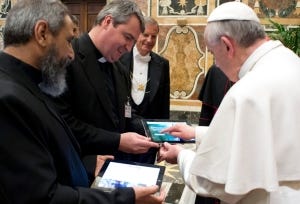“Troll Lege” and the Virtue of Online Mercy
“Avoid the comments section.”
This is fairly standard advice that I and many others who write online tend to get. Indeed, it’s pretty good advice even if you are only reading what others have written. The comments section is intended as a space to continue and deepen conversation about a given article, post, or video. Some comments sections are even nicely designed, so that conversations are nested and hold together in a coherent way. Yet these pages often devolve into the internet equivalent of shouting matches: back and forth exchanges of ALL CAPS rage that, if they even respond to what one person was saying, only do so to call them a bigot/heretic/idiot/Satan-worshipper/Jesuit-lover/rad-trad who wants to see the church change everything/go back to the 1950’s/go back to the 1550’s/become Anglican/expel all but the faithful remnant.
This is not to say that none of those posts have problems or aren’t acceptable. Or to say that the church does not include some number of bigots, heretics, and idiots. Rather, what I’m interested here is how often the responses online offer more snark than light, more rage than discourse. Sometimes this takes the form of the Internet Troll, who delights in undermining conversations with vitriol, and sometimes it’s the cyber-bully, who attacks someone from the behind the relative safety of the digital screen.
In his 2015 message for World Communications Day, Pope Francis wrote about the frequency of “foul language….discord and poison” in contemporary communication. While his focus in that message is on communication in the family, one can just as easily see the Pope training his gaze on trolls and cyberbullies. There, Francis calls on us to “break the spiral of evil” through “blessing rather than cursing.” Indeed, he offers, in his own way, the common advice “Don’t feed the trolls.”
But, in line with the College Theology Society’s theme this year of “Liturgy + Power,” we cannot ignore that those who act viciously online have power. It’s certainly true that the mediation of the internet protects us from direct physical harm, but this may also be the phenomenon that enables the viciousness of some. Because we are not physically present to one another – we are not face to face – we do not experience the vulnerability of the other or of ourselves. I think here of philosopher Emmanuel Levinas, who said that the “face of the other” makes an ethical claim on me, and that claim is “thou shalt not kill.” In many cases, digital media means that we never directly encounter the face of the other, and so we never feel that claim. This can make it far easier to be vicious, snarky, or demeaning to one another.
And yet, we are vulnerable online. Just about anyone who has ever put themselves out there, whether through a piece of art, a written work, a YouTube video, has made themselves vulnerable. Ideas, commitments, beliefs are on display. There is something of the self put at risk, and the trollish response can cause pain.
Where does this response come from, and can it be otherwise? It might be helpful here to think here about the idea of formation, of habits. If we repeatedly act in certain ways, it will become a habit, a second nature, to us. There’s a famous quote, sometimes attributed to Mark Twain but actually from Abraham Maslow, that says “if all you have is a hammer, everything looks like a nail.” As we practice social media, we come to see the world through its logic. We speak (and even think) with things like “hashtag,” we see events as things we can Instagram or tweet about, we google people we’ve just met in order to know as much about them. We see someone write something we don’t like, and it’s easier to take a quick, cheap shot at it than to engage and challenge it critically.
But formation is not only about vices; more deeply, it is about virtues. While technology surely creates a formation system that trains us into its own logic, that doesn’t mean these modes of interaction and these media are in themselves entirely disposed towards good or evil. Rather, these habits that we form come largely through the choices we make about how to engage. Indeed, as Pope Francis notes, “It is not technology which determines whether or not communication is authentic, but rather the human heart and our capacity to use wisely the means at our disposal.”
Thus, as this year of mercy continues, I exhort us to turn away from the vices that we can forge online and instead inculcate some virtue. In particular, the internet is a place needing merciful people. In this year’s World Communications Day message, Pope Francis exhorted us
to remain especially attentive to the way [we] speak of those who think or act differently or those who may have made mistakes. It is easy to yield to the temptation to exploit such situations to stoke the flames of mistrust, fear and hatred. Instead, courage is needed to guide people towards processes of reconciliation.
If we can habituate ourselves to merciful blogging, merciful tweeting, and other forms of merciful engagement, perhaps the “first Areopagus of the modern age” can become a place of light, of community, and of charity.



